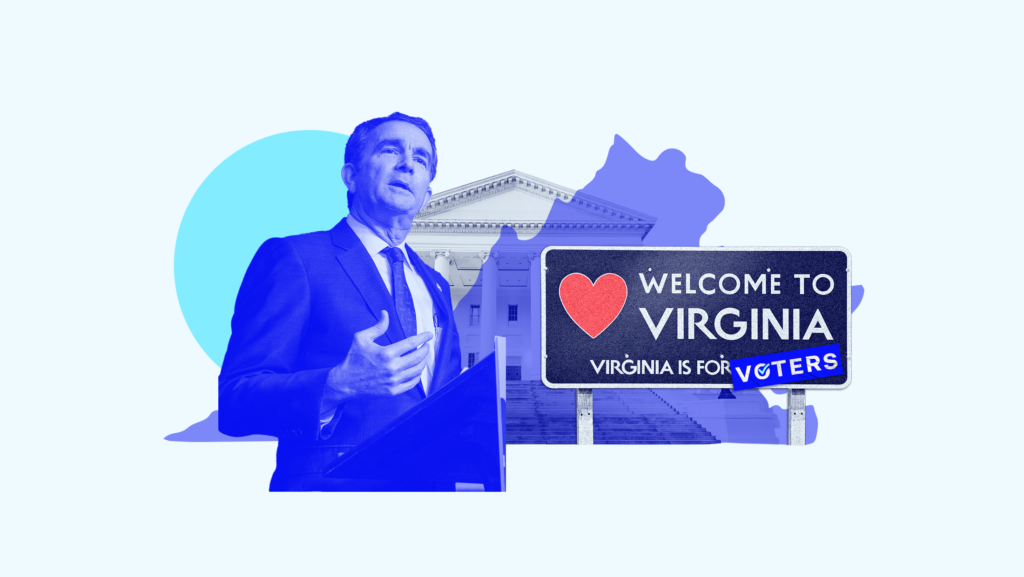Virginia Is Leading the Way on Voter Protection

As Black women born and raised in the South, we know all too well the painful history of voting discrimination in this nation. We grew up listening to the stories of literacy tests, poll taxes and other barriers put in the way of family members exercising the right to vote. Since the ratification of the 15th Amendment over 150 years ago, generations of our families, like Black families across the South, sacrificed to expand the right to vote to all. We were proud to do our part by passing the Voting Rights Act of Virginia to protect those rights for generations to come.
Last month, we celebrated the 56th anniversary of the signing of the Voting Rights Act of 1965. At the same time, the U.S. Supreme Court has further eroded the federal Voting Rights Act, and across the country, Republicans are attempting to strip away access to the ballot box. In July, we were proud to stand with our colleagues from Texas, who broke quorum to prevent a slate of new voter restrictions and call on Congress to pass federal voting rights legislation. We’re closely watching the U.S. Justice Department’s lawsuit against the state of Georgia over their newest voting restrictions law, which goes so far as to make it a felony to give a bottle of water to someone waiting in line to vote. In Arizona, we are seeing a forced audit of ballots from the 2020 election predicated on President Trump’s “Big Lie.” Already this year, 17 states have enacted 28 new laws that restrict access to the right to vote, according to the Brennan Center for Justice. It’s all part of a coordinated state-by-state attack on voting rights.
In Virginia, our story is the opposite. While other states are threatening voting rights, Virginia is taking action to protect voting rights for generations to come. This week, we joined Governor Ralph Northam for a ceremonial signing of the Voting Rights Act of Virginia, which makes Virginia the first state in the South with a state-level Voting Rights Act. These new protections are now in effect in the Commonwealth, as early voting begins on Friday. We worked hand in hand with a number of advocacy groups to write and pass this bill to protect voters from suppression, discrimination and intimidation, and to make Virginia a beacon for the nation on voting rights.
Just a decade ago, Republicans controlled Virginia’s government and passed numerous laws to make it harder to vote — particularly for voters of color. Just five years ago, Virginia was the second-hardest state to vote in among all 50 states. Last year, the Democratic-controlled Legislature made great strides in expanding voter access by creating no-excuse absentee voting, repealing restrictive voter ID laws and passing temporary measures to make voting during COVID-19 easier and safer. As a result, Virginia in 2020 became the 12th easiest state in which to vote in the country.
With the Voting Rights Act of Virginia, the Commonwealth is taking the opposite approach to states like Georgia and Arizona. Virginia is leading the way, making a bold statement against voter suppression and safeguarding the right to vote for every Virginian.
The Voting Rights Act of Virginia will curb discriminatory voting practices by requiring that all changes in local voting laws and procedures are advertised in advance, and are evaluated for their impact on Black, Indigenous and communities of color — those most commonly targeted by voting suppression. These requirements will prevent sudden election law changes, like in 2020 when the Richmond City registrar’s office moved to a new location that was inaccessible by bus, primarily making it more difficult for low-income individuals and people of color to vote.
Additionally, the Voting Rights Act of Virginia creates an avenue to sue those who knowingly dispense false information to voters, which is already a criminal offense. By allowing civil lawsuits, Virginians who have been negatively affected by disinformation will have an economic remedy against their wrongdoer. Furthermore, this lawsuit option can act as a deterrent against those who plan to engage in voter suppression via disseminating false information.
Starting this month, our Voting Rights Act of Virginia will also expand requirements for polling locations to provide voting materials in languages other than English. Currently, this is only a requirement for federal elections, but voters in state and local elections deserve voting materials in the language that they speak. Increased voting materials, in addition to the aforementioned requirement regarding law changes, will ensure that equal access to the ballot is protected for Virginia’s non-English speaking populations.
In Shelby Co. v. Holder (2013), the U.S. Supreme Court gutted the federal Voting Rights Act of 1965. Since then, several states have passed new laws that have made it more difficult for poor people, people of color and elderly people to vote. Last month, the Court further gutted the Act by making it more difficult to challenge voter suppression laws. But our Voting Rights Act of Virginia fills the holes left by the Court and protects Virginia voters now and in the future.
It has been 56 years since the federal Voting Rights Act was passed and we are still seeing a coordinated and intentional effort to restrict voting rights across the nation. With the Voting Rights Act of Virginia, the Commonwealth is taking the opposite approach to states like Georgia and Arizona. Virginia is leading the way, making a bold statement against voter suppression and safeguarding the right to vote for every Virginian. We hope to see more states — and the federal government — take similar action to protect the right to vote for generations to come.
Delegate Marcia S. “Cia” Price represents the 95th District in the Virginia House of Delegates.
Virginia State Senator Jennifer McClellan represents the 9th District and ran for governor of Virginia in the 2020 Democratic primary.